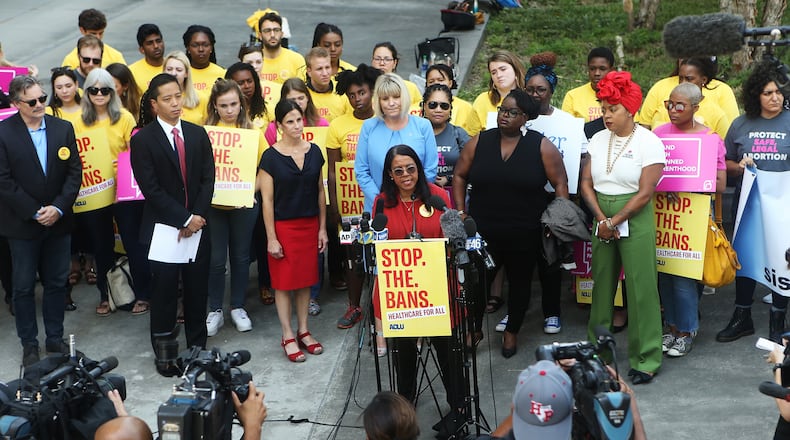A federal judge will hear arguments Monday from opponents of Georgia’s abortion law urging him to rule the measure unconstitutional.
Gov. Brian Kemp last year signed one of the nation's strictest abortion laws, outlawing the procedure in most cases once a doctor can detect fetal cardiac activity. District Judge Steve C. Jones in October temporarily blocked the law from going into effect while the case plays out in court. It was set to take effect the first day of this year.
The American Civil Liberties Union of Georgia wants Jones to make the injunction permanent. The group, on behalf of several abortion rights advocates and providers, sued the state, saying the law violates a woman's constitutional right to abortion as established by the U.S. Supreme Court ruling in Roe v. Wade.
Attorneys for the state say the case should be dismissed and the law should be allowed to go into effect. Any ruling in the case would almost certainly be appealed.
Attorneys for the ACLU said the new law was essentially a ban on abortions.
“While every person is entitled to their own opinion, every woman is entitled to her own decision,” said Sean Young, the legal director of the ACLU of Georgia. “These are private decisions that should be made free of government interference.”
Attorneys for the state argue that the new law, which was introduced as House Bill 481, does not violate a woman's constitutional right because she can still get an abortion before cardiac activity is detected. If it goes into effect, it would outlaw abortions as early as six weeks into a pregnancy, before many women know they are pregnant.
“A state may properly recognize that an unborn child is alive even before ‘viability’ and — consistent with its power to protect unborn life — may prohibit the killing of that child by restricting certain types of previability abortions,” attorneys for the state wrote the court.
Jones will also consider various so-called "personhood" provisions in the legislation, which extend legal rights to fertilized eggs.
The ACLU argued that the “personhood” components of the law were vague and made it difficult for its clients, abortion providers, to know when they would be in violation.
That language would allow parents, once a fetal heartbeat is detected, to claim an embryo on their taxes as a dependent, and the embryo would be counted toward the state’s population. Under the law, a court could also order a father to pay child support after a heartbeat is detected.
Jones wrote in the October ruling that he agreed the language was too vague.
Abortion has continued to be a divisive issue in Georgia and nationwide, even throughout the coronavirus pandemic.
States such as Alabama, Arkansas, Louisiana, Ohio, Oklahoma, Tennessee and Texas attempted to block access to abortion by declaring the procedure nonessential health care at the height of various stay-at-home orders and social-distancing requests made to stem the spread of COVID-19. But judges ruled that states could not block access to the procedure.
In Georgia, Kemp signed an executive order in May that specifically denied abortion providers special legal protections that he extended to other hospitals and medical workers during the coronavirus pandemic. The executive order gave health care providers additional legal protection from personal injury lawsuits.
A Kemp spokeswoman at the time said abortion providers were “undeserving of enhanced liability protections because they are doing nothing to fight COVID-19 in Georgia.”
There are about 20 lawsuits involving abortion that the U.S. Supreme Court could consider that would challenge Roe v. Wade, but supporters of Georgia's new law said they believe it is the one that will overturn the landmark ruling.
The U.S. Supreme Court in May heard arguments in a Louisiana case to determine whether the state can require abortion providers to have admitting privileges at nearby hospitals. Four years ago, the court found a nearly identical Texas law unconstitutional, but the makeup of the court has shifted with the addition of two justices appointed by President Donald Trump.
About the Author
Keep Reading
The Latest
Featured




